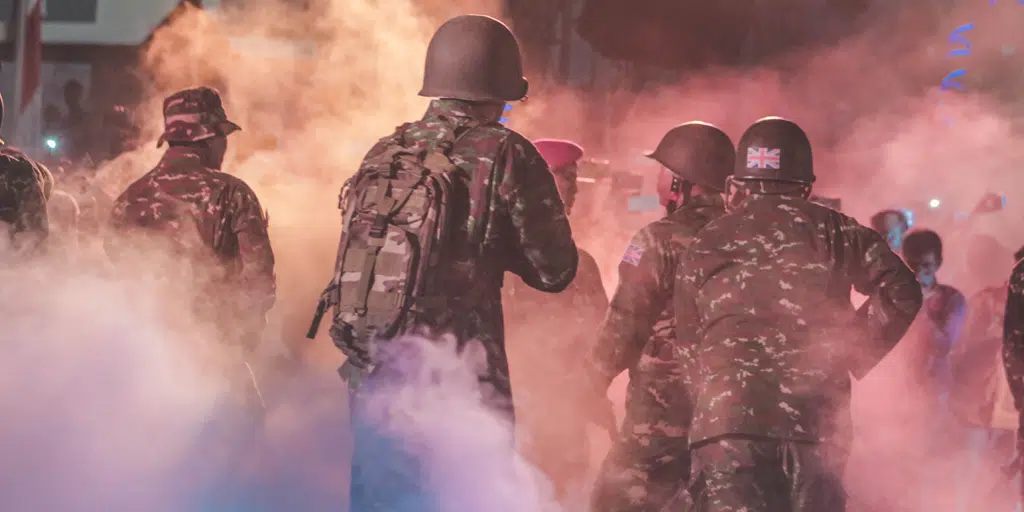Who Are the Nations in Ezekiel 38?

Who Are the Nations in Ezekiel 38?
Ezekiel 38 mentions several nations that will come against Israel in a future battle. Who Are the Nations in Ezekiel 38
The main nations are noted in Ezekiel 38:1-6:
The word of the Lord came to me: “Son of man, set your face against Gog, of the land of Magog, the chief prince of Meshek and Tubal; prophesy against him and say: ‘This is what the Sovereign Lord says: I am against you, Gog, chief prince of Meshek and Tubal. I will turn you around, put hooks in your jaws and bring you out with your whole army—your horses, your horsemen fully armed, and a great horde with large and small shields, all of them brandishing their swords. Persia, Cush and Put will be with them, all with shields and helmets, also Gomer with all its troops, and Beth Togarmah from the far north with all its troops—the many nations with you.
Gog is noted 11 times in Ezekiel 38-39 as the leader of the invasion. Gog appears to be an individual rather than a group or nation. Nine other names are mentioned.
The following nations and/or groups are listed:
- Magog: According to first-century Jewish historian Josephus, the land of Magog was inhabited by the Scythians. The Scythians lived throughout Central Asia, indicating its identity is associated with nations today such as Kazakhstan, Kirghizia, Uzbekistan, Turkmenistan, and Tajikistan. Some also include Afghanistan in this group.
- Rosh: Rosh is the remote part of the north (38:6, 15; 39:2). Because of this, most interpreters identify Magog as Russia, at least part of Russia, or perhaps Russia and some of the former Soviet nations connected with it.
- Meshek (or Meshech) and Tubal: Noted together in this passage, this area is located in part of modern-day Turkey.
- Persia: This is the land of modern Iran.
- Cush (or Ethiopia): This land, often translated as Ethiopia, is not the same as modern Ethiopia. It represented the land south of Egypt. Today, this nation is Sudan.
- Put: Also translated in some versions as Libya, this land is still known as Libya today.
- Gomer: Part of modern Turkey.
- Beth Togarmah: Part of modern Turkey.
Wrap Up on Who Are the Nations in Ezekiel 38
As can be seen, these are all nations surrounding Israel, many of which hold strong feelings against Israel today. Though we do not know when the events of Ezekiel 38 will take place, we can identify the locations today. At some future time, God will draw these nations against Israel where Scripture predicts they will be supernaturally defeated by the Lord.








I do believe that it is game just ready to take place prelude to the tribulation
Sounds like some of the BRICS nations
These nations are all involved in the Russia-Ukraine war happening right now.
Amen. Our pastor recently preached about this. We are living in the last of the last days.
How many countries have chemical weapons
Zechariah 14:12
Zeccharya 14:12
Says chemical weapons 1st time in world that war
But ELIJAH AND MOSES have already arrived.. THEY are preparing the Nation’s for THE GLORIOUS COMING OF MESSIAH.
I’m sorry but the connection between Rosh and Russia is not there. Rosh is a Hebrew word meaning leader or head. “The prince of rosh” is referring to the Chief Prince, not a the prince a place. The text should read “I am against you, Gog, chief prince of Meshek and Tubal” and most translations now don it this way. Some people try to claim that ‘rosh’ is a Greek mistranlation of ‘rus’ but why would a Greek insert the Hebrew word for chief? Why not just use rus? Just because rosh sounds somewhat but not really similar to Rus or Russia in English that’s not how translation works. The land far to the north is Europe.
Agreed. No link between Rosh and Russia, which is much more Christian, than Europe.
It is Russia, it’s the land north of Isreal. Everything directionally that the bible talks about is in relation to Israel. What nation is the farthest north of Israel other than Russia? yeah I suppose it could be Finland, but that makes no sense, We have to apply this into a modern context.
Amen Brother, but the correct Translation is in the KJV
Who is the chief prince of Turkey? Is it not Putin? Erdogan does nothing on a global scale without Russia’s approval. So Gog is of the land of Magog (Russia), yet still the one who’s really pulling the strings of meshech and tubal (Turkey). Both are descendants of Japheth.
I don’t know what map you own, but Europe is not north of Israel, unless you’re referring to Turkey as Europe. Draw a straight line from Jerusalem to the arctic pole and you’ll run directly over top of Moscow.
Does this pass the smell test? Let’s see, is there any connection currently between Russia, Turkey, Iran, Syria, and the others listed in this passage? If that doesn’t convince a person then nothing will.
The name “Rosh” has been the subject of considerable debate among prophetic interpreters. Dispensationalists who have taken it as a proper noun and identified it with a place, Russia, have been criticized as being both unscholarly and sensationalist. The other alternative is to take the term as an adjective meaning “head” in description of Gog as “chief prince of Meshech and Tubal.” However, on linguistic and historical grounds the case for taking Rosh as a proper noun rather than a noun-adjective is substantial and persuasive. Rosh as a place name appears in Egyptian inscriptions as Rash as early as 2600 B.C., and one inscription from 1500 B.C refers to a land called Reshu that was located to the north of Egypt. As a toponym (place name) Rosh (or its equivalent) is found over twenty times in other ancient documents, including three times in the Septuagint (LXX), ten times in the inscriptions of Sargon, once in the record of Ashurbanipal, once in the annals of Sennacherib, and five times in the Ugaritic tablets of ancient Syria (a close cognate language to Hebrew). When Ezekiel wrote this prophecy (6th century B.C.), several bands of the Rosh people lived in an area to the north of the Black Sea. Linguistically, the name Rosh was originally associated the tribe of Ros/Rus which lent its name to a variety of topographical features in what is now the Ukraine and Russia. On historical, geographical, and toponymic grounds it is best identified with the modern day Russian people. Linguistically, the very name “Russia” appears to have been derived from this term Rosh. This location is also confirmed by the first-century Jewish historian Flavius Josephus (Antiquities 1.6.1) who identified Magog (the land of Rosh) as the land of the Scythians, ancient northern nomadic tribes who inhabited the territory from Central Asia across the southern steppes of modern Russia. Based on such evidence, the noted Hebrew lexicographer and grammarian Wilhelm Gesenius stated over 150 years ago that Rosh must be “undoubtedly the Russians, who are mentioned by the Byzantine writers of the tenth century, under the name the Ros, dwelling to the north of Taurus … as dwelling on the river Rha (Wolga).” Based on this evidence, Clyde Billington has concluded: “Historical, ethnological, and archaeological evidence all favor the conclusion that the Rosh people of Ezekiel 38–39 were the ancestors of the Rus/Ros people of Europe and Asia … The Rosh people who are mentioned in Ezekiel 38–39 were well-known to ancient and medieval writers by a variety of names which all derived from the names of Tiras and Rosh … Those Rosh people who lived to the north of the Black Sea in ancient and medieval times were called the Rus/Ros/Rox/Aorsi from very early times … From this mixture with Slavs and with the Varangian Rus in the 9th century, the Rosh people of the area north of the Black Sea formed the people known today as the Russians. Therefore, despite the objection of critics to this position, the prophecy of Ezekiel 38-39 most likely is a prophecy of a “Russian”-led invasion of Israel.
Notes
The absolute state of the Hebrew Rosh indicates it should function as a proper noun rather than a “noun-adjective” in the construct chain. For the grammatical argument in favor of this option see James D. Price, “Rosh: An Ancient Land Known to Ezekiel,” Grace Theological Journal 6:1 (Spring 1985): 67-89. The earliest translation of rosh as an adjective (“chief, head”) was by the Jewish translator Aquilla, probably based on the non-grammatical use of the term in this text by the first-century Jewish historian Flavius Josephus. Jerome, the translator of the Latin Vulgate adopted Aquilla’s incorrect translation and through his influence it has passed into many modern translations.
Billington, “Rosh People (Part Two),” 145-46.
James D. Price, “Rosh: An Ancient Land Known to Ezekiel,” Grace Theological Journal 6 (1985): 71-73.
For the arguments in support of this identification see Clyde E. Billington, “The Rosh People in History and Prophecy” (Parts 1-3), Michigan Theological Journal 3:1-2 (1992): 54-64, 142-174, and 4:1 (1993): 38-62, and Mark Ruthven with Ihab Griess, The Prophecy that is Shaping History: New Research on Ezekiel’s Vision of the End (Fairfax, Virginia: Xulon Press, 2003), pp. 55-116.
For the evidence for this conclusion see the pertinent discussions in the above references. However, the term “Meshech,” although similar to the term “Moscow,” cannot be identified with the modern city on the basis of the available evidence.
Wilhelm Gesenius, Thesaurus Linguae Hebraeae et Chaldaeae Veteris Testamenti, p. 752 (only the original Latin edition has his full-page defense of rosh as a proper noun).
Clyde E. Billington Jr., “The Rosh People in History and Prophecy (Part Three),” Michigan Theological Journal 4 (1993), 59, 61.
Thank you for that. I never saw a reason to doubt that Rosh and Magog had to do with Magog. And that was before Russia started to attack Ukraine. It seems obvious to me that the way Russia amd China operate that they are the nations that God is going to “hook” and bring to Israel for their judgment and destruction. They are responsible for more murders than any other country with their Communist regimes. They fit the description of the type of nations that God would “hook” and bring into a trap for their destruction, similar to how God tricked pharaoh and hooked him to follow after Israel to be destroyed in the Red Sea.
Jeremy, excellent insight on the evil and abominations of China and Russia and God’s impending judgement upon them
Thank you brother for such a scholarly and in-depth dissertation of the subject. Your time and effort has not gone unnoticed and surely gives much food for thought & research.
Perfectly explained Randall Price – thank you
Whatever form this alliance takes, we don’t seem to need to discuss it anymore, we can observe it instead. God bless Israel.
This will be amazing to see the power or God in real time!
I hope the media let’s us see it.
It sounds like we will feel the earthquake anyway
Since this Ezekiel 38 war is won by God for Israel why do people think this is the end of last days. The last war is real is trodden on and Gods people have to flee. Am I right?
Beyond measure in explation. I smell the hook may take place soon. I m watching the turn of events as Israel will be celebrating 77 year of Independence. Be careful of the blend of the perfect number 7 which always stand for completion in God’s moves